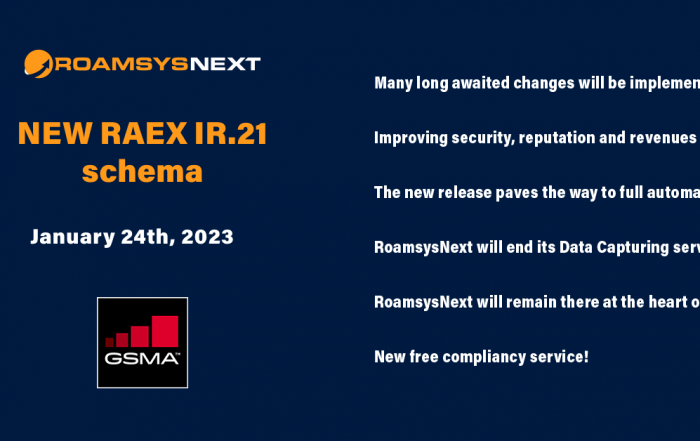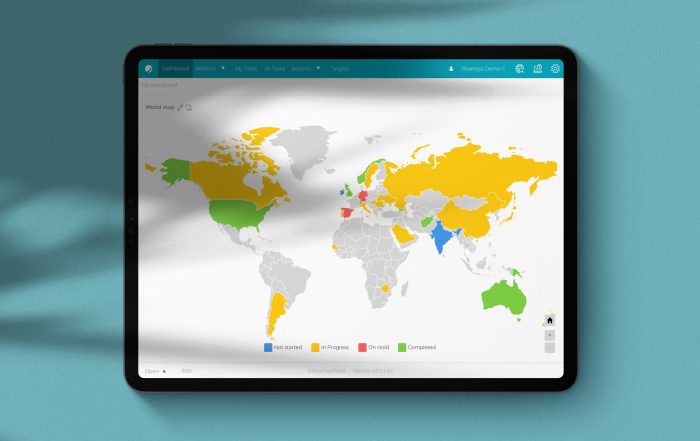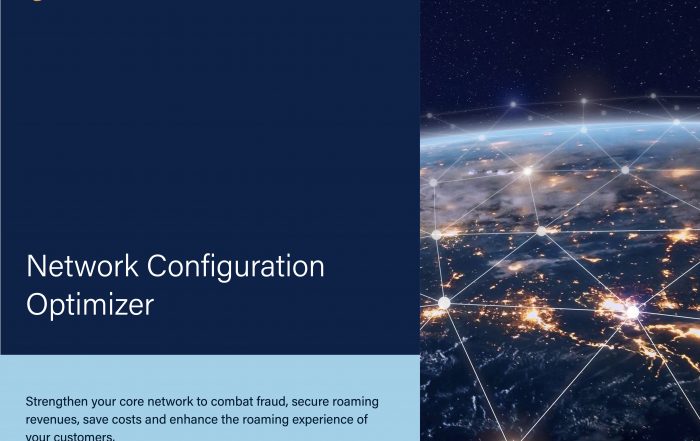
Gabriele Lieser
CUSTOMER SUCCESS MANAGER
Summary
As mobile communication determines our lives to a large extent already, attacks on mobile networks can have worse repercussions than ever before. Attacks on core network infrastructures can affect millions of subscribers. Correct data is key to verifying that the message is of trustworthy origin to handle signaling attacks. Especially the roaming industry is in charge of ensuring the validation and updating of data because roaming partner configurations change over time. Already today, our tools simplify to a crucial extent the initial and ongoing correct configuration of every roaming relevant network element to help MNOs block any unwanted or unauthorized traffic.

In RoamsysNext Insights our experts share their views on extensive industry topics and possible solutions we can offer.
Do you remember the “olden times”, before the use of mobile phones and, later on, smartphones became common practice? It seems hard to imagine life without telecommunications. We are long used to engaging in e-banking, online-shopping, e-government, etc. and we are also used to onetime passwords over SMS for transaction confirmation that regulate access to the required networks. As mobile communication determines the functionality of our lives to an ever-increasing extent, attacks on mobile networks can have severe consequences. Upsetting subscribers and causing churn may be one of the more benign disturbances unlike dire effects on national critical infrastructure (civil, energy, agricultural, healthcare..) and wider industrial processes. Criminals can reap huge benefits from exploiting network vulnerabilities through signaling attacks.
The SS7 (Signaling System 7) network exchanges data between devices and telecommunications networks. This is what allows mobility, roaming, SMS, voice calls and all the services provided by a mobile network to its subscribers.
What are signaling attacks?
It was originally developed decades ago when only ‘trusted’ fixed-line operators were interconnected (a so-called walled garden), so security in the protocols was of little importance. For newer 4G networks, the Diameter protocol replaces SS7, however it contains many of the same vulnerabilities. Signaling is again being updated in upcoming 5G networks, however mobile operators will have to support legacy (2G/3G/4G) networks for some time to come.
The use of legacy SS7 and newer Diameter protocols for attacks has been documented for some time and is quite prevalent globally. Effectively, an attacker gains access to the SS7/Diameter interconnect network and can perpetrate an attack against any mobile network and subscriber in the world if their home network does not provide protection. These attacks range from privacy violations (location tracking, intercepting calls and SMS messages) to fraud, to outright denial of service attacks on core network infrastructure, affecting millions of subscribers.

Two Factor Authentication Fraud
SMS is a widely used method for two factor authentication (2FA), especially for financial institutions. One example of a signaling attack involved criminals gaining access to an online bank account, then intercepting the 2FA SMS message being sent to the mobile phone of account owner, subsequently stealing hundreds of thousands of Euro from this account.
This is a double blow to mobile operators as subscriber trust is eroded but so is industry trust in SMS, out of which many mobile operators make large revenues from A2P SMS messaging. Controlling the SMS messaging arriving into an operator’s network from international, national and business includes knowing exactly which source numbers are associated with which countries, networks, hubs and businesses.
Location tracking
Whether the mobile phone is the latest state-of-the-art smart phone with GPS or an ancient brick with a battery that can last several years, signaling attacks can track any mobile subscriber’s location globally from the comfort of their own hideout. This type of tracking can be used for multiple purposes, such as espionage, but also for determining the location of high profile individuals to gain knowledge of whereabouts (e.g. if they were meeting specific other individuals or companies). Furthermore, the criminals advertise this location tracking ability for anyone to use on the dark web, thus allowing this information to be determined by anyone with the funds for any targeted mobile subscriber.
Protection against Signaling Attacks
Protection and investigation of attacks relies on ensuring the network has enforced the correct configurations for interconnecting with other networks. It goes without saying that operators will have deployed countermeasures to filter traffic from unknown and unwanted sources and take the latest intelligence and updates from acknowledged signaling security experts to continually keep on top of new attack vectors.
Scary though, how quickly misconfigurations are discovered by attackers and exploited to their benefit, which is why this is the first port of call for the network and security team. As roaming partner configurations change over time, the validation and updates of these configurations is key to ensuring the doors and windows to your network are closed.

A stitch in time saves nine
As you can see, monitoring and preventing attacks using network nodes and signaling firewalls is highly recommended. Operators need an approach at multiple levels: key to their effectiveness is valid, up-to-date industry data regarding roaming partners, number ranges, contact details and other intelligence regarding sources of attacks.
Fraudsters take their jobs as seriously as we do, and they are as innovative on a permanent basis. Time to put a stop to the craft, there is no time to lose. Increasing challenges due to global developments, rising costs and competitive surroundings call for more strategic and proactive leadership against fraud.
Already today, our tools simplify to an extraordinary extent the initial and ongoing correct configuration of every roaming relevant network element. This helps MNOs to block any unwanted or unauthorized traffic with very little effort. It certainly is an easy-to-use application to increase efficiency, transparency, and enhance resource management, and we continuously optimize our applications to serve our customers even better. Likewise, we are increasingly keeping an eye on upgrading security aspects. Since we are experienced in developing the InfoCentre RAEX Tools application on behalf of the GSMA, our tools are fully compliant and can be most easily implemented and aligned to your specific requirements. Talk to us, we will listen to you.
Gabriele Lieser joined RoamsysNext in 2020 as Customer Success Manager to strengthen the bonds with our increasing number of customers and to support the marketing team. Gabriele has a strong background in corporate sales. She studied at the Universities of Trier (Germany) and Manitoba (Canada) and is incorporated in the RoamsysNext Client Service Team.
“The team is a crucial asset”
It has been an exciting year for RoamsysNext. And as 2023 is coming to an end, we took the opportunity to talk with CEO Michael Grasmück about the past year, the growing team that becomes more and more international, and the comeback of an industry institution.
15 years of RoamsysNext – Driving Global Connectivity
RoamsysNext turns 15, so we talked with CEO Michael Grasmück about the anniversary, the early years, the move to Luxembourg and the future within the fast-developing roaming industry.
The new age of the IR.21 – Be ready for the full automation!
The new RAEX IR.21 schema will be released early 2023 with great changes coming that allow us to revolutionize the way we work with the IR.21 data.
Reporting at a glance: The RoamsysNext Dashboards
The RoamsysNext tools offer many reporting functionalities of which the dasboards play an important role. Learn more about using them in practice to identify bottlenecks, visualize your team's performance and bring a smile to your management's faces.
End-2-End-Automation with Network Configuration Optimizer
The RoamsysNext Network Configuration Optimizer is the perfect solution to make the shift from manual processing to more and more automated processing, with the option to move to full automation. Let's see how it works.
From Roamsys to RoamsysNext
Sixteen months ago, Roamsys relaunched and became RoamsysNext. Time to look back to a year we never expected to happen.
How to Stay Secure
What can MNOs do to stand up to the ever-growing tide of telecom fraud and protect their assets? Stay alert, use great tools, collaborate with other market players, and take the fight to the fraudsters.
Telecom Fraud Hurts
Telecom fraud is a rapidly growing area that has serious effects on national critical infrastructure (civil, healthcare, energy, agriculture...) and wider industrial processes.
The GSMA MISP – How Does it Help?
Malware information sharing and threat intelligence sharing has unbeatable benefits that make any caveats and challenges look small in comparison.
The Experts behind RoamsysNext Insights
RoamsysNext Insights has a growing fan base due to its substantial reports. With a wide variety of great information and exciting insights, they inspire beginners as well as professionals.
How to Treat 2G and 3G Closures without Becoming an Archivist?
As we are entering the era of 5G, legacy networks are in a state of flux and lose significance. This blog is about how the sunsetting of 2G and 3G networks will impact mobile communication.
How to Choose a Signaling Firewall Wisely
In times of global turbulences and increasing fraud attacks the decision for a sophisticated signaling firewall becomes more and more a priority. Some general considerations help to narrow down the choice.
Identity Fraud in Telecom
Identity fraud robs people of their virtual existence; it costs time, money and nerves. But there are countermeasures that help.
How to Tackle the Challenges in Combating Telecom Fraud
Telecom fraud can have dire effects on critical infrastructure and always causes painful loss of revenue. See how the industry's joint efforts tackle the challenges in combating telecom fraud.
Face the Breach: Rehearse an Emergency Before it Happens
In case of a breach, most companies are poorly prepared to take quick action. Have a look at some ideas on how to make the best of a difficult situation and save valuable time.
Working from Home during a Global Pandemic
Due to the broad introduction of remote working, businesses need to rethink their current cyber security measures and consider how they need to be adapted or further developed.
The Future of Roaming Trainings – An interview with Milja Hofman, CEO Roamingwise
Roamingwise is a well-known provider of roaming trainings, seminars and consultancy in a variety of international roaming topics. In our interview, CEO Milja Hofman reveals how she prepares professionals to drive the roaming world.
Historical Fraud Incidents and Lessons to be learned
In the course of history, no era is free from the practice of deception for personal benefit. Let’s have a look at what we can learn from historic fraud cases from ancient Greece to modern times.
Two-Factor Authentication rules!
For some time now, we have introduced 2FA and have contributed our share to provide more secure access to our tools. Norbert Becker, Head of Software Development, picks up the thread and provides engaging insights into his area of responsibility.
Introducing: The RoamsysNext Network Configuration Optimizer
Learn how the RoamsysNext Network Configuration Optimizer enables MNOs to switch safely to full automation and growing roaming revenues by providing effective and secure data management of all roaming related business information.
Introducing: The RoamsysNext Wholesale Roaming Manager
The RoamsysNext Wholesale Roaming Manager provides powerful collaboration and reporting tools for all roaming partner relationships by converging everything from service openings to the user’s roaming footprint, test SIM cards and tariffs, document and contact management.
Don’t fear the breach – three more ways to avoid configuration errors
Three ways to bliss: take bold measures to automate processes as much as you can, check your firewall’s security logs regularly and enforce centralized authentication mechanisms.
We’re in this together
In the second part of our interview with Alexandre De Oliveira, POST Luxembourg Cyberforce, he highlights major pain points in fraud detection and stresses the importance of global information sharing via the GSMA T-ISAC initiative.
Mastering today’s Fraud Landscape
Learn how Alexandre De Oliveira’s team at POST Luxembourg Cyberforce is mastering today’s fraud landscape with penetration tests, security assessments, the Telecom Intrusion Detection System (TIDS) and the Telecom Security Scanner (TSS).
How to avoid configuration errors
Hardening the network is a good way to get configuration errors under control. Introducing smart firewall rules and consistently updating these rules can be very time-consuming, but it’s a crucial measure to be taken.
From customer request to feature
In our newest “RoamsysNext Insights”, David Houstek and Adrian von Wendt elaborate on our customer focused production processes.
Making a Stand against Fraud
In an insightful interview, our CTO, Hendrik Hoehndorf, speaks about further GSMA initiatives on fraud detection and prevention such as the MISP (Malware Information Sharing Platform) and T-ISAC (Telecommunication Information Sharing and Analysis Centre).
Cyber security and fraud prevention – the GSMA approach
How does the GSMA approach cyber security, fraud detection and prevention? Look at the incredible useful tools and informations they provide with the Fraud and Security Group (FASG) and documents on best practice countermeasures.
How insecure GTP makes LTE and 5G networks vulnerable
GTP will still have an impact on 5G. Our tools can help to identify dubious requests faster, reduce reaction times and block incidents in a fraction of time.
How bad can it get? Signaling attacks strike the heart of each MNO
This blog is about how correct data is key to ensuring that mobile communication is of trustworthy origin, especially in case of signaling attacks. Notably, the roaming industry has to take action for data verification.
Grey Routes, Spam, Smish – funny words but nothing funny about SMS Fraud
SMS enjoys the reputation of being a safe channel for communication. But as any system, it is prone to abuse. We show you what needs to be done.
4 more Types of Telecom Voice Fraud MNOs are vulnerable to
Voice fraud is known as one of the top inter-carrier fraud cases, and in order to expose them, time and reliable data is crucial. This article shows that prevention is key to make sure that legitimate traffic is not obstructed.
Three Types of Telecom Voice Fraud that can destroy businesses
This issue shines a light on the variety of security breaches and fraud incidents: A cabinet of horrors.
Problems with telecom fraud? How big the issue really is. And how we can help
Fraud and security issues cause considerable problems within mobile network operators. But we are here to help.
Let’s talk about data quality
Most fraud and security issues are caused by misconfigured network nodes. This article shows, how RoamsysNext treats this problem on their quest for data quality.





























